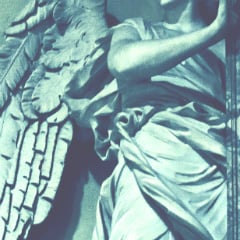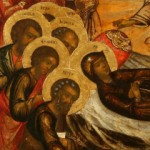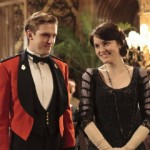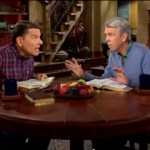Paul Simon’s song “You Can Call Me Al” speaks of a man who sees “angels in the architecture.” The man’s vision is notable and different. He’s “a foreign man,” as the lyric goes, meaning that normal folk like you and me don’t see anything in the architecture but building supplies. So who has the better vision?
The word supernatural is a new one, at least relatively so. It started circulating around the middle of the sixteenth century, before scientific skepticism blew into vogue. It was an unfortunate coincidence. Before the advent of the word, a strange or spiritual occurrence — say, a miracle or a vision of angels — might seem wonderful or even weird. But this new term allowed us to split our world in two. Now the strange and spiritual was, as the word suggests, above or outside or apart from nature.
For an increasingly skeptical world, that became another way of dismissing something as unreal, no longer worthy of attention or contemplation. In this newly divided two-story universe, as Orthodox priest and author Stephen Freeman would call it, the enlightened skeptic was suddenly free to lock the door to the attic and pretend its contents didn’t exist. Reality stood on one side of the divide and fantasy on the other. The once-mystical became simply bogus. We invested the secular with meaning and relevance, and the religious we discounted as folly.
This was a major loss. It was like trying to see with only one eye. We could still make out light and color, angles and shapes. But our sight became flattened and two-dimensional. The new, purely naturalistic view lacked depth and distance. By segregating and ignoring the spiritual, we lost a way of seeing the natural in full, in the round.
C.S. Lewis noted that we think like our contemporaries, even those with whom we disagree. In fact that’s the most deceptive kind of likeness because we cannot imagine that we share assumptions, though we do. I fear this is true when it comes to this spiritual/natural divide. Many Christians are basically naturalists — materialists — like our neighbors. Of course, one small difference is that we pray. And sometimes, though surely not always, we even think there’s a god there listening, maybe even — dare we hope? — the God in whom we profess to believe.
It’s not supposed to be like that. Christians believe that there is nothing other or apart about the spiritual. It’s not strictly supernatural, not in the sense with which we use the word today. For the Christian, sacraments and miracles and angels are part of the natural order. They are ordinary. That is not to say the experience of an angel would be unaffecting, any more than seeing a lion walk by your path would leave you unflustered. You’re allowed to be terrified. You’re also allowed to believe.
To the extent that we think like naturalists, we wander like the blind. Unseen is unbelieved. What we miss we dismiss. But to the extent we reject naturalism, we can truly, consciously, and enthusiastically participate in the divine.













